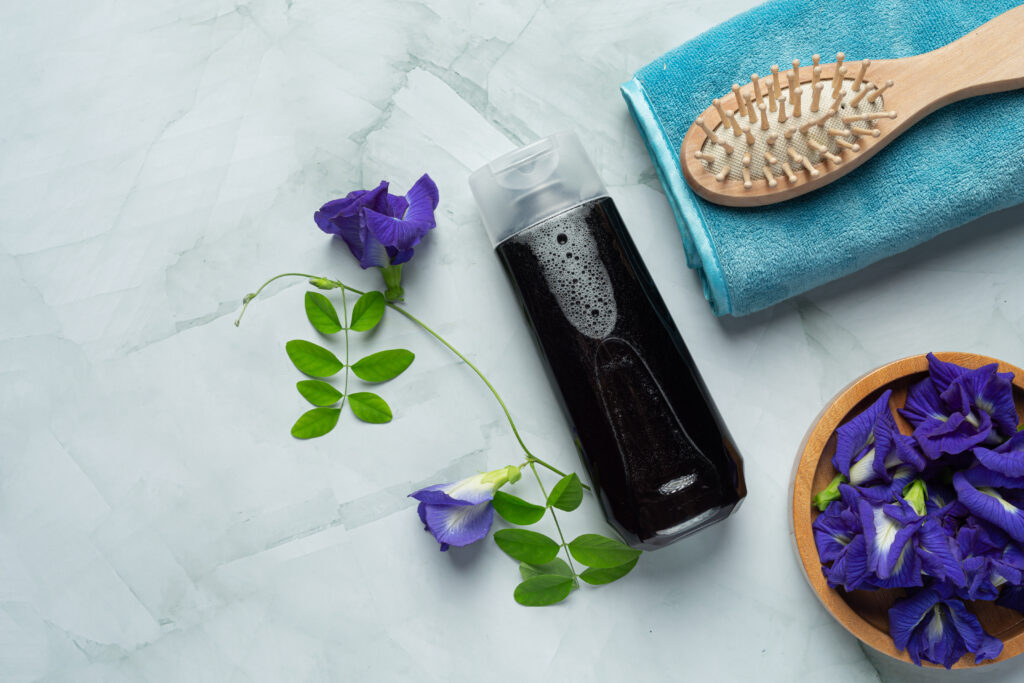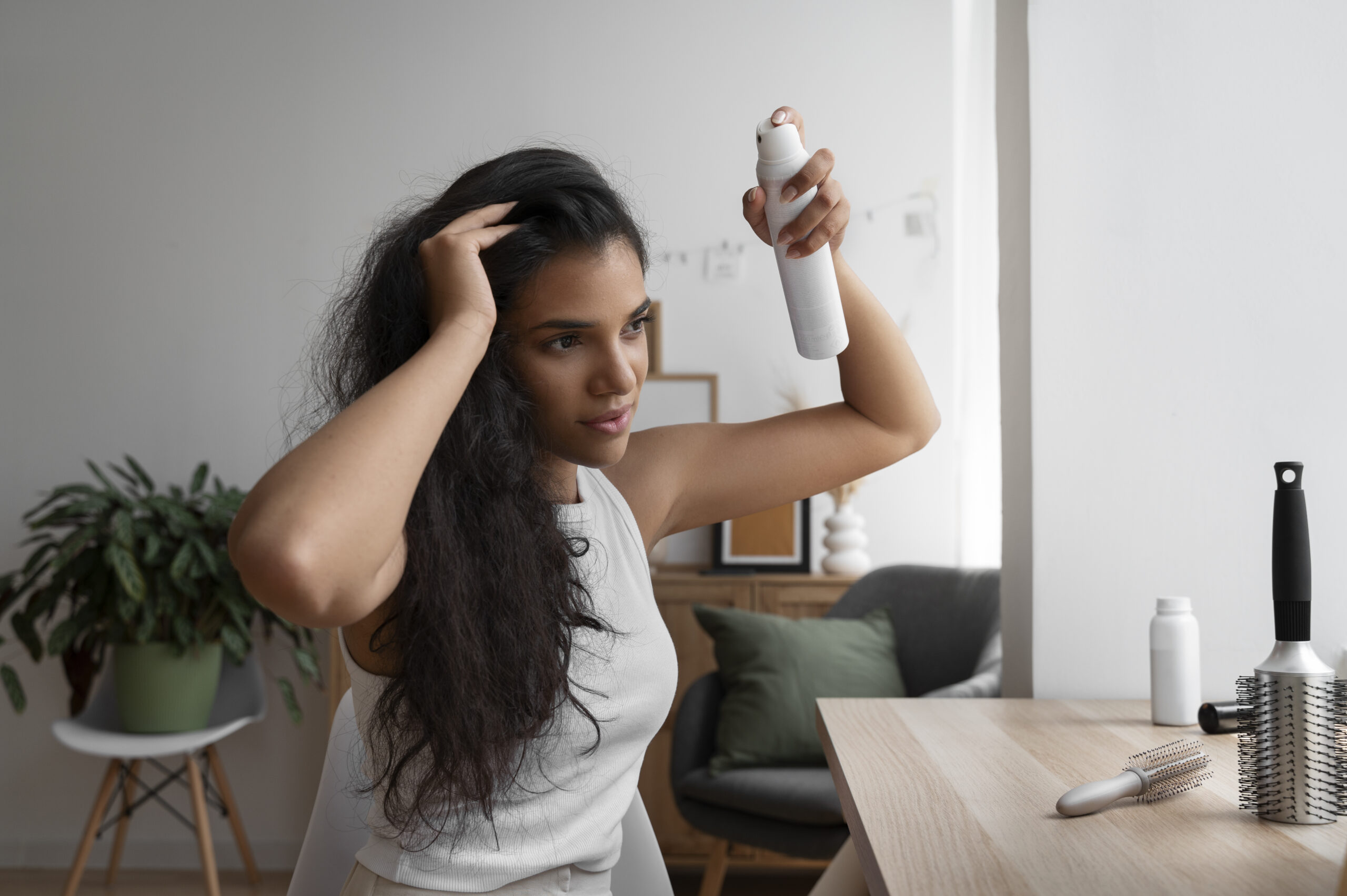Scalp psoriasis is a persistent skin condition marked by red, scaly patches on the scalp that can itch, flake, and sometimes bleed. When untreated, it affects self-esteem and daily comfort.
Research confirms that medicated shampoos and specific topical agents are among the most effective treatments for scalp psoriasis, offering relief from symptoms in many people. For example, a clinical study of Iralfaris shampoo showed a significant reduction in severity after regular use over weeks.
This blog will explore 7 of the best shampoos and scalp psoriasis treatment, covering over-the-counter options, prescription therapies, and natural remedies. Whether your symptoms are mild or severe, these treatments for scalp psoriasis can help you manage flare-ups and improve scalp health.
7 Best Shampoos for Scalp Psoriasis
Below are strong options when considering scalp psoriasis shampoo, each suited to different severity and skin sensitivities.

1. Neutrogena T/Gel Therapeutic Shampoo (Coal Tar)
This product uses coal tar, which slows down skin cell growth and eases scaling, inflammation, and itching. It’s one of the classic treatments for scalp psoriasis, often recommended by dermatologists when plaque buildup is thick.
It may leave a strong smell and increase sensitivity to sunlight, so wearing a hat outdoors and using sunscreen on exposed areas is advised. For many users, using this shampoo once or twice a week provides relief without over-drying the scalp.
2. Dermarest Psoriasis Medicated Shampoo + Conditioner
Combining 3% salicylic acid with a zinc complex, this option addresses multiple symptoms simultaneously: it helps soften scales, reduce redness and itching, and soothe flaky skin. It’s especially useful for people who find that thick flakes block other shampoo treatments from penetrating.
As one of the more versatile treatments for scalp psoriasis, it acts as both a cleanser and mild conditioner, helping prevent the scalp from feeling stripped or drying out too quickly. Using it a few times a week during flare-ups tends to offer the best results.
3. Nizoral Anti-Dandruff Shampoo (Ketoconazole)
Ketoconazole is an antifungal agent that helps reduce fungal components that can worsen scalp inflammation in psoriasis. It’s not only for dandruff; in moderate scalp psoriasis, Nizoral (1% or prescription strengths) is often used as one of the trusted treatments for scalp psoriasis.
Users should leave the shampoo on the scalp for several minutes before rinsing to give its active ingredient time to work. It’s also important to follow up with moisturizing treatments since ketoconazole can dry out hair if used frequently.
4. MG217 Medicated Conditioning Shampoo
With 3% coal tar, this shampoo is recognized by the National Psoriasis Foundation as effective. It slows rapid skin growth and helps soothe symptoms of scalp psoriasis, like itching and flaking.
Because it conditions as well as treats, MG217 is a good choice for those who find other treatments too harsh. It works best when used a couple of times per week during flare-ups, then less frequently for maintenance.
5. Head & Shoulders Clinical Strength (Selenium Sulfide)
Though often thought of for dandruff, shampoos with selenium sulfide are among the effective treatments for scalp psoriasis when symptoms include mild scaling and itch. They help reduce yeast and soothe oily scalp zones.
Since selenium sulfide can color light hair or fabrics, rinsing thoroughly and shampooing carefully matters. Also, pairing it with a gentler shampoo on other days helps protect hair texture.
6. Psoriatrax 5% Coal Tar Shampoo
This stronger coal tar option is useful for people whose scalp psoriasis has thick plaques resistant to lighter treatments. The 5% concentration helps inhibit excess skin cell growth and reduce inflammation.
It’s best used as a treatment rather than a daily wash. Leaving it on for 5–10 minutes lets it penetrate better. Occasional use may suffice once symptoms improve, with maintenance frequency reduced.
7. Iralfaris Urea-/Glycolic Acid / Salicylic Acid Keratolytic Shampoo
In a prospective clinical trial, this keratolytic shampoo (with urea, glycolic acid, salicylic acid, and additional soothing additives) applied three times a week showed measurable improvement in scalp psoriasis severity over 45–90 days.
Because it combines exfoliating and moisturizing agents, it helps dislodge and soften scales without over-drying. This makes it one of the more balanced treatments for scalp psoriasis, especially for those with sensitivity or thick scale buildup.
How to Choose Scalp Psoriasis Treatments Wisely
Finding the right way to manage scalp psoriasis is not just about picking a shampoo from the shelf; it requires strategy, patience, and consistency. If you’re wondering how to choose and use anything for this disease, read the psoriasis scalp treatment guidelines in this section. Below, we break these steps down in detail.
Match Severity with Strength
When considering how to choose & use treatments for scalp psoriasis wisely, the first step is assessing the severity of your condition. Not all shampoos or treatments are suitable for everyone.
- Mild cases: If you experience light flaking and itching, shampoos containing salicylic acid or ketoconazole often work well. Salicylic acid helps to gently remove scales, while ketoconazole controls yeast that may worsen scalp irritation.
- Moderate to severe cases: Thick, stubborn plaques usually need coal tar shampoos or prescription treatments, such as stronger corticosteroid or keratolytic formulations. Coal tar slows down skin cell growth and can significantly reduce scaling.
- When in doubt: Consulting a dermatologist ensures you don’t under- or over-treat your scalp. Using stronger medications unnecessarily can irritate the skin, while using too mild a treatment may not control symptoms effectively.
Leave-On Time Matters
One of the most overlooked aspects of how to choose & use treatments for scalp psoriasis wisely is understanding application time. Simply lathering and rinsing too quickly won’t give active ingredients enough time to work.
Most medicated shampoos recommend massaging the product directly into the scalp and leaving it on for 5–10 minutes before rinsing.
This contact time allows ingredients like coal tar, salicylic acid, or ketoconazole to penetrate scales, reduce inflammation, and combat fungal overgrowth. Skipping this step often leads to disappointing results, even if you are using the right shampoo.
Rotate Active Ingredients
Another crucial tip in how to choose & use treatments for scalp psoriasis wisely is ingredient rotation. The scalp can become less responsive when exposed to the same treatment repeatedly, or irritation may develop.
- Coal tar: Effective for slowing cell turnover but may be too strong for daily use.
- Ketoconazole: Antifungal properties help when yeast is a factor in flare-ups.
- Salicylic acid: A keratolytic that softens and lifts scales.
By rotating these ingredients using coal tar once or twice a week, alternating with ketoconazole or salicylic acid shampoos, you maintain effectiveness while reducing the risk of side effects. This also helps prevent treatment fatigue, where one formula stops feeling effective after long-term use.
Support with Moisturizing Agents
A major part of how to choose & use treatments for scalp psoriasis wisely is remembering that medicated shampoos can be drying.
They strip excess oils, reduce scaling, and calm irritation, but at the same time, they may leave the scalp prone to cracking, flaking, or tightness.
To prevent this, dermatologists often recommend applying fragrance-free moisturizers or scalp oils (such as coconut oil, jojoba oil, or olive oil) on non-treatment days.
These help restore the scalp barrier, reduce irritation, and make it easier for medicated shampoos to work effectively during flare-ups. Keeping the scalp hydrated is not just about comfort; it actively supports healing and reduces flare frequency.
ALSO READ
What is Psoriasis – Symptoms, Types, And Latest Treatments in 2025
7 Best Treatments for Scalp Psoriasis That Actually Work

1. Medicated Shampoos
One of the most common first-line treatments for scalp psoriasis is the use of medicated shampoos. Shampoos with active ingredients like coal tar, salicylic acid, and ketoconazole help reduce scaling, itching, and redness.
These shampoos work by softening thick plaques, slowing down rapid skin cell growth, and controlling yeast that can worsen inflammation.
To get the best results, medicated shampoos need proper use. Dermatologists often recommend massaging the shampoo into the scalp and leaving it on for 5–10 minutes before rinsing.
This contact time ensures the active ingredients penetrate the scales. Rotating different shampoos can also prevent irritation and resistance, making this one of the most reliable treatments for scalp psoriasis.
2. Topical Corticosteroids
Another effective option in treatments for scalp psoriasis is the use of topical corticosteroids. These are anti-inflammatory medications applied directly to the scalp in the form of foams, solutions, or lotions.
They work by calming the overactive immune response that drives psoriasis, reducing redness, itching, and scaling. That is why it is known to be the best steroid for scalp psoriasis. Topical corticosteroids are especially helpful for flare-ups but should be used under medical supervision.
Long-term use may cause side effects like skin thinning, so dermatologists often recommend them in combination with gentler therapies. When applied properly, they remain one of the fastest-acting treatments for scalp psoriasis available today.
3. Coal Tar Preparations
Coal tar has been used for decades as one of the oldest treatments for scalp psoriasis. It slows down the rapid turnover of skin cells, reduces itching, and helps loosen thick scales.
Coal tar is often found in shampoos, gels, and ointments and is particularly useful for moderate psoriasis symptoms. While effective, coal tar products can have a strong odor and may stain fabrics or hair.
Despite this inconvenience, many people still rely on coal tar as it provides lasting relief and can be used in rotation with other products. Its long history of success makes it a trusted choice in treatments for scalp psoriasis.
4. Salicylic Acid Solutions
Salicylic acid is a keratolytic agent widely used in treatments for scalp psoriasis. It works by breaking down the thick scales, making it easier for other topical treatments to penetrate the skin. By softening the plaques, salicylic acid reduces flaking and makes the scalp more manageable.
Regular use of salicylic acid solutions or shampoos can also prevent painful cracking and irritation. However, they may sometimes cause dryness, so combining them with moisturizers is essential.
Many dermatologists recommend salicylic acid as a companion therapy, making it a valuable addition to other treatments for scalp psoriasis.
5. Light Therapy (Phototherapy)
For moderate to severe cases, phototherapy is one of the most advanced treatments for scalp psoriasis. This therapy uses controlled doses of ultraviolet (UV) light to slow down skin cell production and reduce inflammation.
Special comb devices are often used to allow UV light to reach the scalp more effectively through the hair.
Phototherapy can be highly effective but usually requires multiple sessions per week at a dermatologist’s office. It is considered safe when done under medical supervision, though overexposure can cause burns or increase skin cancer risk.
Despite this, light therapy is an excellent option in treatments for scalp psoriasis for people who don’t respond well to shampoos or creams.
6. Systemic Medications
When topical products and shampoos are not enough, systemic medications are considered among the strongest treatments for scalp psoriasis.
These oral or injectable drugs, such as methotrexate, cyclosporine, or biologics, work by suppressing the immune system to stop the overproduction of skin cells. Systemic treatments are usually prescribed for severe or treatment-resistant cases and must be closely monitored due to potential side effects.
While they’re not the first option, they can bring dramatic improvement for people struggling with constant flare-ups. This makes them one of the most powerful treatments for scalp psoriasis available today.
7. Natural Home Remedies
Not all treatments for scalp psoriasis have to be medical. Many people find relief through natural remedies such as aloe vera gel, coconut oil, apple cider vinegar rinses, and tea tree oil shampoos. These remedies help moisturize the scalp, reduce itching, and soothe inflammation naturally.
While home remedies may not cure psoriasis, they often complement medical treatments well. Regular scalp care, stress reduction, and lifestyle adjustments can minimize flare-ups and improve comfort.
For many, combining natural remedies with prescribed medications creates a balanced approach to treatments for scalp psoriasis.
FAQs
What makes a shampoo good among treatments for scalp psoriasis?
A good shampoo among treatments for scalp psoriasis contains active ingredients that reduce scaling and inflammation, such as salicylic acid, coal tar, or ketoconazole. It should balance efficacy with gentleness, ideally being fragrance-free or low-irritant. Frequent use shouldn’t excessively dry or damage hair.
How often should I use medicated shampoos for treating my scalp psoriasis?
Frequency depends on the strength of the shampoo and the severity of your symptoms. For example, stronger coal tar or keratolytics might be used 1–2 times per week during flare-ups, while gentler options like ketoconazole or selenium sulfide can sometimes be used more often. Always follow the label or your dermatologist’s advice.
Can treatments for scalp psoriasis stop flare-ups permanently?
No treatment completely cures scalp psoriasis; most treatments help control symptoms, reduce scale, and push flare-ups into periods of remission. What is key is consistent care and maintenance: applying treatments during flare-ups and using gentler routines in between to prevent relapse.
Are there risks or side effects with these treatments for scalp psoriasis?
Yes. Some treatments, especially coal tar and strong medicated shampoos, can lead to skin irritation, increased sensitivity to UV, staining of hair or scalp, and smell issues. Ketoconazole might dry hair or cause allergic reactions in rare cases. It’s best to patch test and alternate treatments to minimize risks.
Wrap Up
When selecting treatments for scalp psoriasis, know that what works best depends on your symptoms, skin sensitivity, and personal preferences. For many, a combination of a strong medicated shampoo during flare-ups, followed by gentler maintenance treatments, provides a good balance.
It often takes weeks to months to see marked improvement, so being consistent is essential. With careful choice of shampoos, attention to how your scalp responds, and maybe occasional dermatologist supervision, many people regain relief, reduced flakes, and improved comfort.
Source: PubMed



Join The Discussion